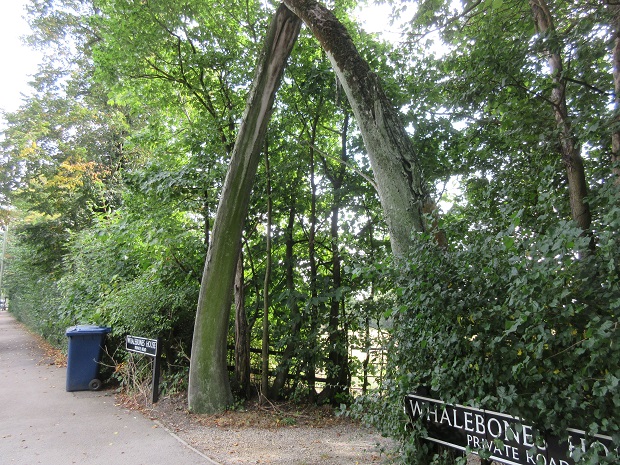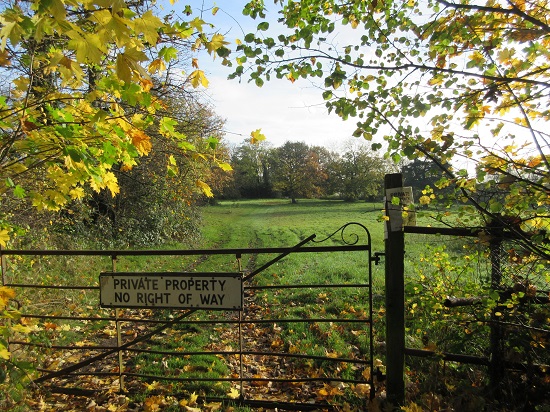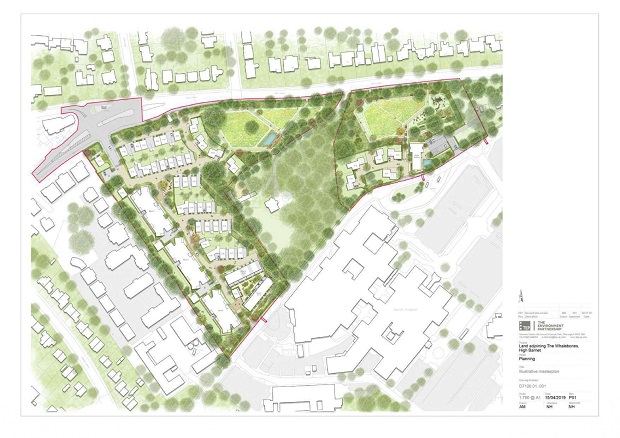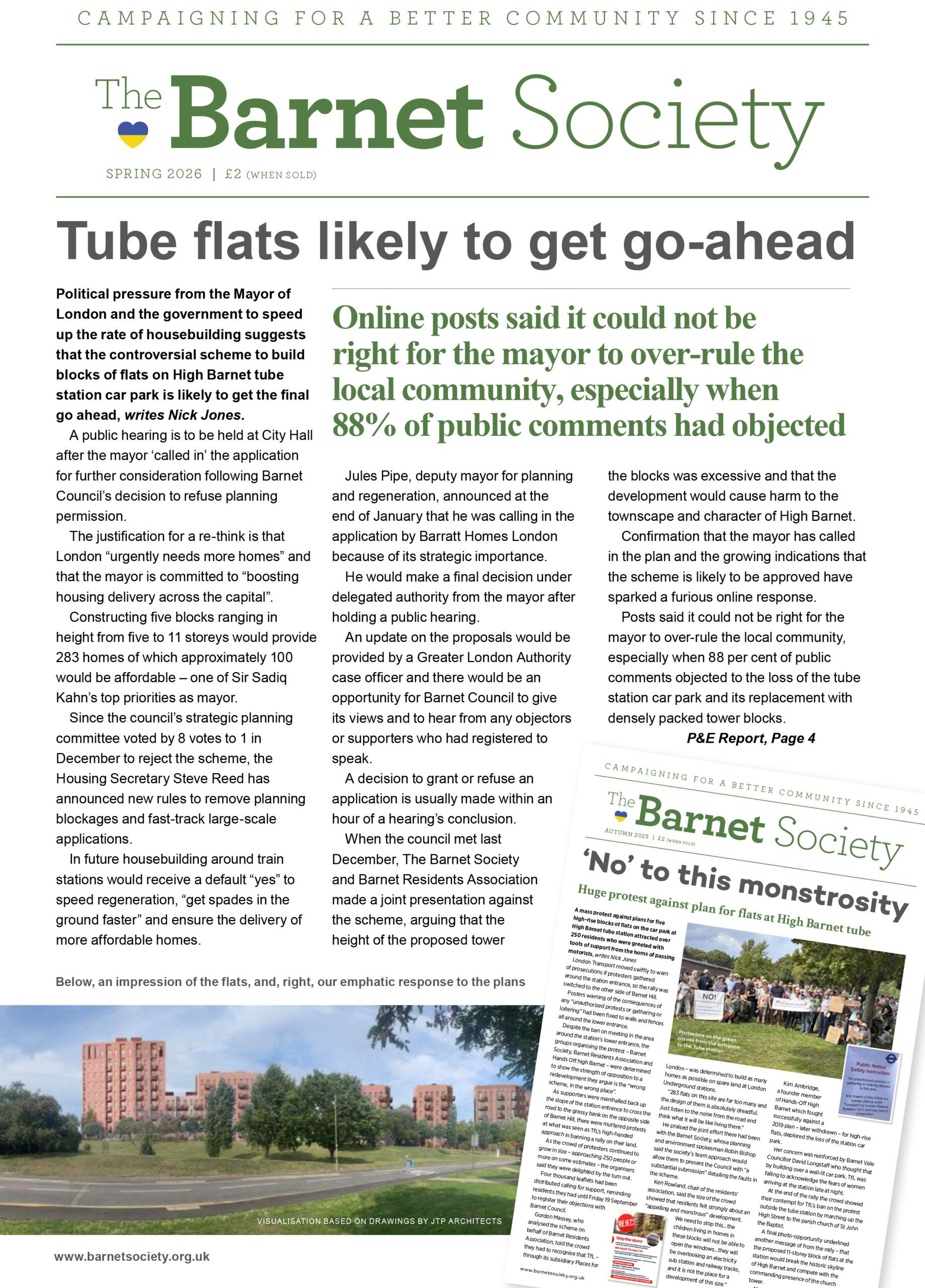Whalebones fields and woods saved again: planning appeal dismissed

A renewed attempt to secure planning approval to build 152 houses and flats on the Whalebones fields and woods has been rejected by a government planning inspector, Jonathan Price.
After hearing evidence at a heated four-day public inquiry, which was held in early September, Mr Price has decided that the harm caused to the Wood Street Conservation Area would outweigh the benefits of new housing.
He was in no doubt that the planned development would have “a significantly harmful effect” on the character and appearance of Whalebones Park and the surrounding area.
His decision to dismiss the appeal by Hill Residential Ltd is as a vindication of a six-year campaign by local residents, the Barnet Society and the Chipping Barnet MP Theresa Villiers.
Mr Price’s conclusion that the adverse impact of the proposed development would “significantly and demonstrably” outweigh the benefits will be regarded as a considerable blow to both Hill Residential and Barnet Council which had zoned the site for 152 new homes in line with the developers’ plans.

Robin Bishop, chair of the Barnet Society’s planning and environment committee, described the decision as “great news” for High Barnet and the importance and preservation of the most historic green space within the Wood Street Conservation Area.
“As a local community group, we are not opposed to all development,” said Mr Bishop. “But Whalebones is a special and significant part of the Conservation Area, and allowing a major housing scheme would have undermined the point of its designation.”
“If new plans are submitted, we hope they are for a much more modest scheme than has been proposed so far, preserve the character of Whalebones and enable its management for the long term.
“Barnet Council should also review their zoning of the site in the local plan for development on the scale of what was proposed by Hill Residential.”
Mr Bishop admitted that in view of the legal forces fielded by Hill and the Trustees he was surprised but delighted by Mr Price’s decision.
The Barnet Society had argued that the harm of the redevelopment would outweigh any public gain from new housing. This had been the Council’s position until shortly before the inquiry and its withdrawal raised doubts as to whether this argument would be accepted by the planning inspector.
Hill Residential may have the option of appealing direct to the Secretary of State to see if the government would back the project but Mr Bishop believed the importance of preserving green, biodiverse spaces such as the Whalebones Park might well count against the developers post-COP26.

In his appeal decision, Mr Price explains that the Whalebones Park does not have any protection against development as either an open or green space, but “neither is the land specifically allocated for housing”.
Residential development on the Whalebones site would be suitable in principle, given the accessibility to services and good public transport connections. Technical requirements regarding highways and public utilities were also met and the scheme satisfied planning policy in respect of the housing mix and standard of accommodation proposed.
“Nevertheless, I am in no doubt that the proposal would have a significantly harmful effect on the character and appearance of the appeal site and surrounding area.
“Whilst the benefits of the scheme are clearly significant, collectively these would not overcome the cumulative substantial weight I attach to the identified harms.
“On a notional tilted balance, the adverse impacts would significantly and demonstrably outweigh the benefits, when assessed against the framework policies taken as a whole.
“In the context of local and national policy, the proposal would not comprise sustainable development in an overall planning balance. Therefore, I conclude that the appeal should be dismissed.”
See details of the decision and reasons for dismissal:
https://acp.planninginspectorate.gov.uk/ViewCase.aspx?caseid=3273189
https://acp.planninginspectorate.gov.uk/ViewDocument.aspx?fileid=44788155
2 thoughts on “Whalebones fields and woods saved again: planning appeal dismissed”
Comments are closed.


That’s great news, all we need now is a petition to remove the moped drivers that congregate outside McDonalds and drive dangerously, weaving in and out of traffic and ignoring the speed limit. Just the other day, one of them approached a queue of cars and decided to ride on the pavement to overtake them, tut tut, all for a warm Sausage and Egg McMuffin.
Great news. Well done to everyone who fought to protect this green space. I hope that there will be no more appeals and that Whalebones can have a secure future as a woodland.